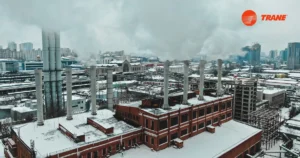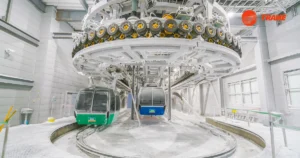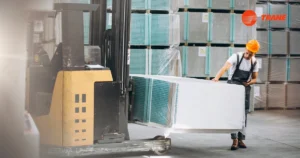In Saudi Arabia, where high summer temperatures can exceed 45°C, efficient cooling is more than a comfort; it is a necessity for productivity, safety, and sustainability. Across commercial complexes, data centers, and industrial facilities, the air-cooled chiller is increasingly seen as a vital solution to balance energy consumption with climate control. As the Kingdom accelerates its Vision 2030 agenda, businesses are being challenged to adopt smarter, greener cooling methods that reduce costs while minimising environmental impact.
The Cooling Challenge in Saudi Arabia
Cooling demand in Saudi Arabia is among the highest in the world due to prolonged summers and rapidly expanding urban development. Air conditioning alone accounts for a significant portion of electricity consumption, especially in densely populated cities such as Riyadh and Jeddah. Traditional cooling systems often place immense strain on the national grid, resulting in soaring operational costs for businesses and environmental concerns for regulators.
Why Air Cooled Chillers Matter
Unlike water-cooled systems that require significant infrastructure and water usage, air cooled chillers rely on ambient air to dissipate heat. This makes them particularly well-suited for Saudi Arabia, where water resources are scarce and operational efficiency is paramount. They also allow for faster installation, reduced maintenance needs, and greater mobility, making them ideal for projects that demand flexibility and scalability.
Energy Efficiency as a Business Imperative
Saudi industries are under increasing pressure to improve energy efficiency, driven by both rising energy prices and government sustainability initiatives. Air cooled chillers are engineered to deliver superior efficiency levels by using advanced compressors, variable-speed drives, and optimised heat exchangers. For facility managers, this translates into reduced energy bills and a more reliable cooling infrastructure, ensuring long-term savings and resilience.
Applications Across Key Sectors
Air cooled chillers have become a preferred choice across multiple sectors:
- Commercial real estate: Office towers, shopping malls, and mixed-use developments in Riyadh and Jeddah rely on efficient cooling to attract tenants and ensure customer comfort.
- Healthcare: Hospitals and clinics require precise, uninterrupted cooling to safeguard patients and sensitive medical equipment.
- Industrial facilities: From petrochemical plants to food processing factories, air cooled chillers support critical operations where downtime is not an option.
- Data centers: As Saudi Arabia invests heavily in digital infrastructure, reliable cooling ensures that servers and equipment operate at peak efficiency.
Supporting Vision 2030 Goals
Saudi Arabia’s Vision 2030 emphasizes energy diversification, sustainability, and the efficient use of resources. Air cooled chillers align perfectly with these objectives, reducing reliance on water-intensive cooling systems while cutting electricity consumption. By adopting modern chiller technology, businesses not only improve their bottom line but also demonstrate compliance with the Kingdom’s environmental goals, positioning themselves as leaders in responsible growth.
Overcoming Operational Barriers
One of the challenges businesses face is the upfront investment required for advanced cooling technologies. However, the long-term savings and operational reliability far outweigh the initial cost. Additionally, modern rental solutions are making advanced air cooled chillers more accessible, allowing businesses to deploy the technology without committing to full ownership. This flexibility helps companies scale according to demand, maintain resilience during peak summer months, and reduce risks associated with equipment downtime.
Partnering with Reliable Providers
As demand grows, not all solutions in the market offer the same level of reliability and efficiency. Choosing a trusted provider like Trane ensures access to the latest chiller technology, backed by expert service and support. With decades of experience in Saudi Arabia, Trane delivers rental and long-term solutions designed to perform under the Kingdom’s toughest climate conditions, ensuring both operational continuity and energy savings.
Conclusion
For businesses in Saudi Arabia, energy-efficient cooling is no longer optional—it is essential for resilience and growth. Adopting advanced solutions such as air cooled chillers allows companies to cut costs, conserve resources, and align with national sustainability goals. To achieve the highest standards of efficiency and reliability, organisations must work with partners that understand the unique climate and operational demands of the Kingdom. By doing so, they ensure their cooling infrastructure is future-ready, efficient, and robust, while benefiting from reliable heating rental options for year-round temperature management.




